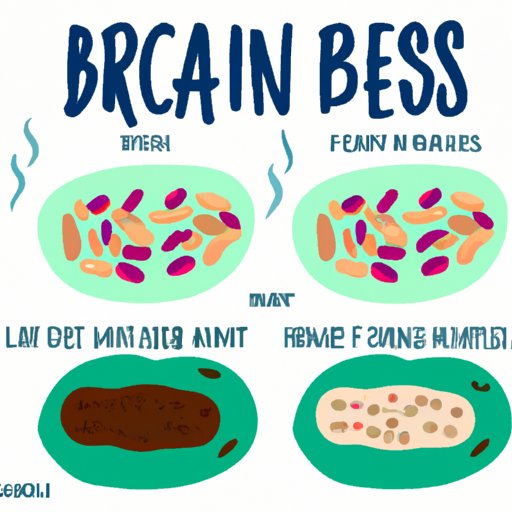
Do Beans Make You Fart? Understanding the Science Behind Flatulence
Flatulence, the act of passing gas from the rectum, is a natural bodily function that everyone experiences. While the phenomenon is both natural and normal, it is also often a source of embarrassment and discomfort – especially when it comes to the foods we eat. Beans, in particular, have been associated with flatulence for generations, earning them a reputation as the ‘musical fruit.’ Yet, do beans really make you fart? And if they do, are there ways to enjoy them without experiencing excessive gas?
The Science behind Flatulence: Why Do Beans (and Other Foods) Make Us Fart?
Before we dive into the potential flatulence-causing properties of beans, it’s essential to understand the science behind gas production in the digestive system. The human gut houses trillions of microorganisms, collectively called the gut microbiota, whose primary role is to break down the foods we eat and extract nutrients while simultaneously keeping harmful bacteria under control. During this process, the microbiota ferment carbohydrates, such as starches, in the colon, leading to the creation of gas as a byproduct. As a result, it’s normal for every person to experience some level of gas production.
However, certain foods are known to exacerbate gas production. Beans, in particular, contain complex sugars called oligosaccharides, which our bodies can’t digest easily. Instead, the microbes in our gut ferment these sugars, producing gas as a byproduct. Furthermore, beans also contain high levels of fiber, which adds bulk to stools and promotes regular bowel movements. While good for digestion, this can also contribute to gas production as undigested fiber ferments in the colon.
Finally, the protein present in beans also plays a role in their flatulence-causing properties. Specifically, the digestion of protein-rich foods creates sulfur-containing gases, contributing to the noxious odor associated with gas.
Debunking Common Myths About Flatulence
One of the most common misconceptions about flatulence is that beans are the sole cause of gas. While beans are indeed high on the list of gas-producing foods, other culprits include cruciferous vegetables like broccoli and Brussels sprouts, carbonated drinks, artificial sweeteners, and more. The most important thing to remember is that the human body naturally produces gas, and some foods may increase flatulence more than others.
Tips to Enjoy Beans without the Farts
For those who love the taste and health benefits of beans but want to avoid excessive gas, preparation is the key. Soaking beans overnight before cooking can reduce the oligosaccharide content, thus lowering the amount of gas produced. Adding herbs and spices like bay leaves and cumin to the cooking water can also help to reduce flatulence. Moreover, consuming small portions of beans and chewing them thoroughly can aid digestion and decrease gas production. Lastly, incorporating fermented foods like kimchi and miso into your diet can also help to mitigate excessive flatulence.
The Social Stigma of Farting: Why We’re Embarrassed to Let One Rip
While farting is a natural bodily function, it’s also widely considered taboo in many cultures, causing people to feel embarrassed or ashamed. The societal taboo surrounding flatulence can lead people to hold in gas, which can cause discomfort and even pain. Those who feel especially self-conscious about letting one rip can choose to try using the bathroom or an excuse to excuse themselves to avoid embarrassment. Additionally, wearing loose-fitting clothing can make releasing gas more comfortable and discreet.
The Farting Olympians: How Athletes Navigate Flatulence on the World Stage
For high-performance athletes, flatulence can pose a particular challenge, especially during competitions. Professional athletes like cyclist Chris Froome and tennis player Novak Djokovic have admitted to using strategies like consuming less gas-producing foods before competitions or even farting before the competition starts to release any gas beforehand. For athletes, finding the balance between maintaining proper nutrition and avoiding excessive flatulence can be challenging, but it’s essential to perform at their best.
Bean-Free Diets: Are They Really the Key to Avoiding Flatulence?
While some people may experience excessive gas production when consuming beans or other legumes and feel the need to avoid them, it’s not always necessary. Alternative high-fiber foods like quinoa, seeds, and berries can provide equivalent nutritional benefits without causing excessive flatulence. Those with irritable bowel syndrome or other digestive issues may benefit from a low-FODMAP diet, which avoids high-fermentable foods like beans and dairy that can cause gas and bloating.
Conclusion
Beans are a beloved, nutrient-dense food choice for many people. While excessive flatulence can be uncomfortable and embarrassing, there is no need to avoid beans altogether. Understanding the science behind flatulence and taking steps to prepare beans correctly can reduce gas production while still enjoying the numerous health benefits of legumes. If excessive gas persists even with these strategies, exploring alternative high-fiber foods can allow individuals to maintain a healthy diet without experiencing discomfort.





